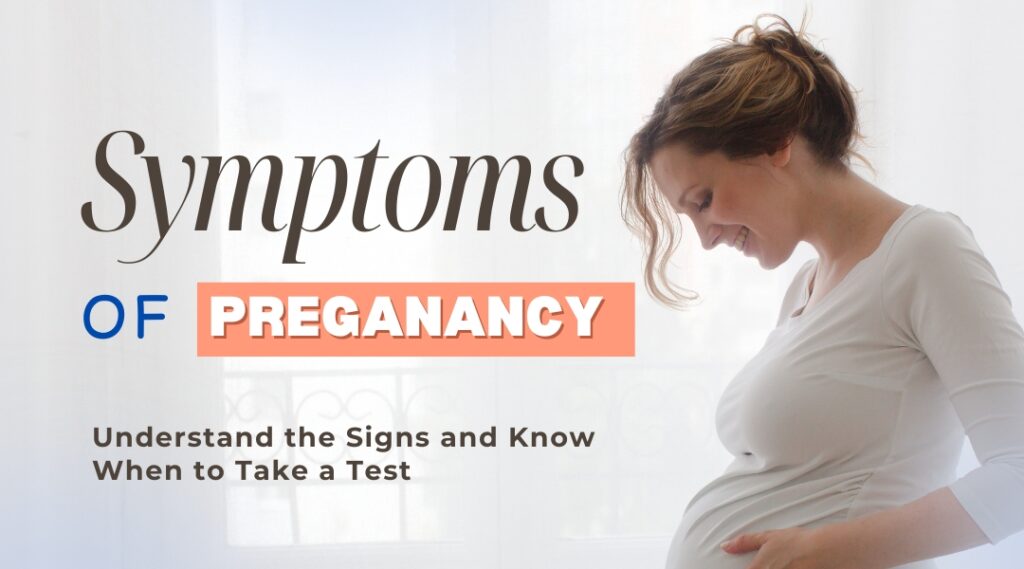
Are you wondering that you might be pregnant because you just missed your periods or maybe your stomach feels a little different, and you’re unsure whether it’s pregnancy or just a result of a messed-up sleep schedule.
In this blog we’ll break down what pregnancy is, what are the symptoms of pregnancy and what is the right time to take a test.
All in a friendly, easy-to-understand way!0
What Is Pregnancy?
Pregnancy is the process in which a baby develops inside a woman’s uterus, and it mostly happens after sexual intercourse, but it can also happen through assisted reproductive technologies (ARTs)Typically it lasts about 40 weeks an average of 266–270 days, or about nine months from fertilization to birth. It begins when a sperm fertilizes an egg, which then implants itself in the lining of the uterus. During pregnancy, a woman’s body goes through many changes to support the growth and development of the baby until birth.
Common Signs of Pregnancy
Every pregnancy is different, but some early signs can be common. Here are few common Symptoms of pregnancy.
Missed Period: One of the first and most obvious signs, especially if your cycles are regular. However, if your periods are irregular, it might be harder to notice.
- Tender, Swollen Breasts: Hormonal changes can make your breasts feel sore or sensitive early on. This usually eases up as your body adjusts.
- Nausea (Morning Sickness): You might start feeling nauseous, with or without vomiting, mostly in the starting one to two months after you become pregnant.
- Frequent Urination: You might notice that you visit the washroom more often.Your body produces more blood during pregnancy, Your kidneys filter your blood and remove the extra waste. This waste leaves your body as pee.
- Fatigue: Most of the women feel extremely tired in early pregnancy. This sign of pregnancy happens because of high levels of the hormone progesterone in the body.
Other Early Pregnancy Signs:
- Mood Swings: Hormones can make you feel more emotional or irritable than usual.
- Bloating: You might feel puffier than normal, similar to how you feel before your period.
- Light Spotting (Implantation Bleeding): A small amount of spotting may occur when the fertilized egg attaches to the uterus.
- Mild Cramping: Light uterine cramps can happen as your body adjusts.
- Constipation: Slower digestion due to hormonal changes can lead to constipation.
- Food Aversions or Sensitivity to Smells: Your taste and smell might suddenly shift due to pregnancy hormones.
- Nasal Congestion: Increased hormones and blood volume can cause a stuffy or runny nose.
If you’re having a mix of common and uncommon pregnancy symptoms, it might be time to reach for a pregnancy test.
When Should You Take a Pregnancy Test?
The best time to take a pregnancy test is after you’ve missed your period. Most pregnancy tests work by detecting the hormone hCG in your urine. If taken too early, the test may not give accurate results.
Here are some helpful tips:
- Wait at least a week after a missed period for the most accurate result.
- Use the first urine of the morning for better hormone concentration.
- Follow instructions carefully on the pregnancy test packaging.
If your pregnancy test is positive, you should follow up with a healthcare provider for confirmation and next steps. If it’s negative but you still have pregnancy symptoms, try again in a few days or consult your doctor.
Read More: Japanese Girl Names ,Japanese Boy Names ,Korean Girl Names, Korean Boy Names .
Final Thoughts
Pregnancy can feel overwhelming, especially in the early days of wondering and waiting.
Paying attention to pregnancy symptoms, both common and uncommon, can help you decide when to take a pregnancy test.
Stay calm, listen to your body, and don’t hesitate to reach out to a healthcare provider if you need clarity.
Curious to learn more about early signs and timelines? Explore our other blogs for tips, support, and real talk about your pregnancy journey!
FAQs
1. What are the earliest signs of pregnancy?
👉Early symptoms can include a missed period, nausea, fatigue, frequent urination, and breast tenderness. These signs may appear even before a missed period.
2. When is the best time to take a home pregnancy test?
👉For the most accurate results, it’s recommended to take a home pregnancy test after the first day of a missed period. Testing too early may lead to inaccurate results.
3. How accurate are home pregnancy tests?
👉When used correctly, home pregnancy tests are about 99% accurate. However, the accuracy can vary depending on the brand and how closely the instructions are followed.
4. Can a negative home pregnancy test result be wrong?
👉Yes, false negatives can occur, especially if the test is taken too early or not according to the instructions. If you suspect you’re pregnant despite a negative result, wait a few days and test again.
5. What should I do if I have pregnancy symptoms but a negative test result?
👉If you continue to experience pregnancy symptoms despite a negative test, consider retesting after a few days or consult with a healthcare provider for further evaluation.



0 Comments